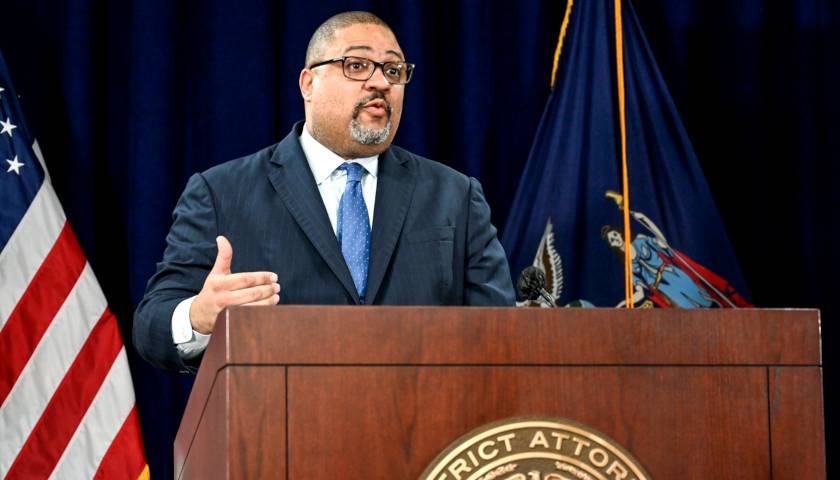by Katelynn Richardson
Prosecutors finally displayed the documents at the heart of Manhattan District Attorney Alvin Bragg’s case against former President Donald Trump on Monday, but have yet to establish a direct link to demonstrate Trump’s culpability.
 Until Monday, prosecutors had been focused on setting up other pieces of their case: the context for the $130,000 payment made to porn star Stormy Daniels to keep her quiet about claims of a sexual encounter and the broader “conspiracy” to influence the 2016 election they allege Trump was involved in. Monday’s witnesses — former Trump Organization controller Jeffrey McConney and Trump Organization accounts payable supervisor Deborah Tarasoff — offered starkly different testimony than earlier witnesses like David Pecker and Keith Davidson, providing no salacious celebrity stories and an almost exclusive focus on accounting.
Until Monday, prosecutors had been focused on setting up other pieces of their case: the context for the $130,000 payment made to porn star Stormy Daniels to keep her quiet about claims of a sexual encounter and the broader “conspiracy” to influence the 2016 election they allege Trump was involved in. Monday’s witnesses — former Trump Organization controller Jeffrey McConney and Trump Organization accounts payable supervisor Deborah Tarasoff — offered starkly different testimony than earlier witnesses like David Pecker and Keith Davidson, providing no salacious celebrity stories and an almost exclusive focus on accounting.
Through their testimony, prosecutors introduced the invoices, ledger entries and checks the 34-felony count indictment against Trump claims he falsified, allegedly to reimburse his former attorney Michael Cohen for the Daniels payment.
Bragg was only able to bring the core charges for falsifying business records, which had passed the statute of limitations, by charging them as felonies and alleging they were done to conceal or commit another crime, which is why much of the prosecution’s case has focused on highlighting Trump’s involvement in the alleged “conspiracy.”
During cross examination with McConney and Tarasoff, Trump’s defense sought to cast doubt on the president’s personal responsibility by raising questions about his direct involvement in repaying Cohen.
The crux of the matter rested on former Trump Organization CFO Allen Weisselberg’s instructions for how McConney should repay Cohen, which the jury saw worked out in his handwritten notes on a copy of Cohen’s bank statement. The notes included a $180,000 reimbursement for the Daniel’s payment and for a payment to a tech company, which Weisselberg doubled to cover taxes, and a $60,000 bonus: working out to a total of $420,000.
McConney explained how that payment was divided into $35,000 installments across twelve months and categorized as “legal expenses” pursuit of a retainer agreement, which he noted he never saw.
The defense sought to demonstrate that Trump’s involvement in this plan was not clear.
On cross examination, McConney agreed he had “very few” conversations with Trump during his time at the organization, and none about these payments in particular.
Defense attorney Emil Bove highlighted that the way of doing business was in “flux and chaos” at the beginning of 2017 when Trump became president. He noted that McConney was unaware of many details involving the payments, including whether or not Cohen was doing legal work or not.
Defense attorney Todd Blanche took a similar angle in cross-examining Tarasoff, asking if it was correct that Trump never directly gave her permission to cut the checks.
“Correct,” she said.
Under the normal process, an invoice would be approved by Weisselberg. McConney would instruct Tarasoff to pay the amount. She would then cut the check and have it sent for a signature.
Defense attorney Todd Blanche steps up for a brief cross examination, highlighting her lack of interactions with Trump.
Blanche: You didn't get permission to cut the checks from Donald Trump himself?
Tarasoff: Correct
— Katelynn Richardson (@katesrichardson) May 6, 2024
Trump did sign a number of the checks to Cohen. Both of Monday’s witnesses — McConney and Tarasoff — testified that only Trump could sign checks for his personal account, even once he became president.
Tarasoff testified they would send the checks to the White House, and they would return with his signature.
Before wrapping up for the day, prosecutor Joshua Steinglass estimated the prosecution had two weeks, possibly a little more, left of presenting their case. Trump said in the hallway following the end of proceedings that he “thought they were finished today.”
“The judge asked them, and playing right into the judge’s hands, the judge is so happy about two to three more weeks because they all want to keep me off the campaign trail,” he said, according to the pool report. “This is what this is all about — election inference, how do we stop it — and it’s a disgrace.”
Before witness testimony started Monday, Merchan ruled that Trump violated his gag order for the tenth time, fining him for comments he made about the jury. Merchan said next time the court “will have to consider a jail sanction.”
– – –
Katelynn Richardson is a reporter at Daily Caller News Foundation.
Photo “Manhattan District Attorney Alvin Bragg” by Manhattan District Attorney’s Office.




